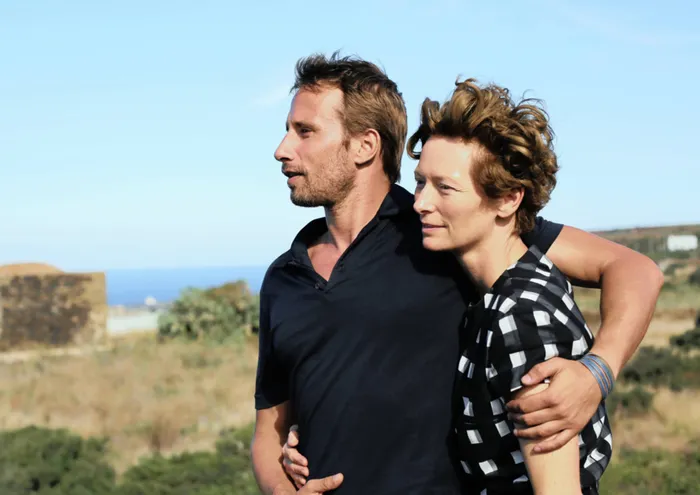
RZ6A0782.JPG RZ6A0782.JPG
A Bigger Splash
DIRECTOR: Luca Guadagnino
CAST: Tilda Swinton, Ralph Fiennes, Matthias Schoenaerts, Dakota Johnson
CLASSIFICATION: 16 LSND
RUNNING TIME: 135 minutes
RATING: 3 stars (out of 5)
Deborah Young
Continuing to experiment with extreme emotional choices motivated by sexual desire, director Guadagnino follows up his acclaimed I Am Love with a far less satisfying study of seduction and destruction in A Bigger Splash.
This remake of Jacques Deray’s cult 1969 film, La Piscine, vaunts an equally cool and desirable cast (Swinton, Fiennes, Schoenaerts and Johnson) and an updated role for the female lead, who is now a proactive rock star. But the film feels empty and intellectualised at the core, where it should feel powerfully emotional.
The action is set on the volcanic island of Pantelleria, far south off Italy’s coast and currently the landing point for numerous boat people. David Kajganich’s screenplay reminds us of the drama of these desperate migrants, who are glimpsed in passing, confined to mesh cages in front of the police station or hiding amid the island’s dark rocks, and they are tentatively drawn into the story’s ambiguous ending as scapegoats for the rich and careless.
But the world belongs to the beautiful people. Marianne Lane (Swinton), first glimpsed in a sequined Ziggy Stardust outfit receiving the adulation of a stadium full of fans, is taking time out with her partner Paul (Schoenaerts) while her voice heals after an operation.
It’s imperative that she not speak above a whisper or, like Julie Andrews, she could lose her singing voice for ever.
Despite her minimum dialogue, Swinton’s sunny intelligence makes words superfluous, as she communicates with broad gestures and a few husky remarks.
Her idyll with the loving Paul is interrupted by the intrusion of her exuberant record producer and ex-lover, Harry (Fiennes), who brashly arrives unannounced with his jail-bait Lolita of a daughter, Penny (Johnson). Descending on their solitude, he turns up the volume of Rolling Stones tracks while talking non-stop about himself.
Fiennes brings a manic intensity to the role that is as amusing for the audience as it is grating for Paul. Their relationship is even more complicated by the fact that Harry introduced Marianne to Paul, practically passing her on to the younger man, when he felt their affair was over. It isn’t.
Harry’s verve for living puts Paul on the defensive. A recovering alcoholic, Paul finds himself surrounded by bottles of wine by the devilish Harry who, one begins to suspect, has an agenda.
Then there is the complication of Penny, who parades around the house in micro-clothes and comes on strong to Paul, when she’s not cuddling her father.
She’s not 100 percent convinced he’s her real dad, anyway. Although she announces she’s 22, her long bleached-blonde hair, childlike body and bratty personality belie it.
Like Harry, Penny is a character you love to hate. Both are blessed with some very good lines of dialogue, and their catty remarks aim straight at the stability of the “conservative” couple, Paul and Marianne.
It’s all good fun up to here. Between exploring the island and slumming it around the big local feast of St Gaetano, the quartet manoeuvre for emotional ground.
When Paul takes Penny on a hike to a deserted bay, and the southern wind called the Sirocco rises, one can feel the power of the landscape to blow away lies and hypocrisy. But as the dramatic denouement approaches, the emotional climax is slow in coming, and the film ends on a bizarre and unsatisfying note of farce.
The crisp brightness of the island, its distant sea and burnt-out foliage are well used as envelopes for the sometimes amusing, sometimes dramatic goings-on, just as Guadagnino’s bold use of contrasting music from the Stones to Jobim to Verdi, brings a smile.
– The Hollywood Reporter
If you liked, Somewhere or Maps to the Stars, you’ll like this.
